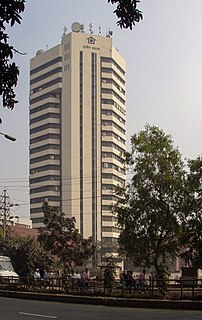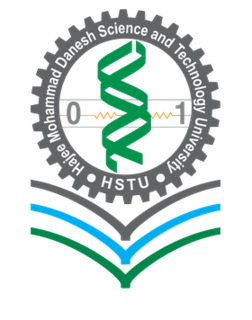Related Research Articles
The liberalisation of Bangladesh's telecommunications sector began with small steps in 1989 with the issuance of a licence to a private operator for the provision of inter alia cellular mobile services to compete with Bangladesh Telegraph and Telephone Board (BTTB), the previous monopoly provider of telecommunications services within Bangladesh. Significant changes in the number of fixed and mobile services deployed in Bangladesh occurred in the late 1990s and the number of services in operation have subsequently grown exponentially in the past five years.

Muhammad Yunus is a Bangladeshi social entrepreneur, banker, economist and civil society leader who was awarded the Nobel Peace Prize for founding the Grameen Bank and pioneering the concepts of microcredit and microfinance. These loans are given to entrepreneurs too poor to qualify for traditional bank loans. Yunus and the Grameen Bank were jointly awarded the Nobel Peace Prize "for their efforts through microcredit to create economic and social development from below". The Norwegian Nobel Committee said that "lasting peace cannot be achieved unless large population groups find ways in which to break out of poverty" and that "across cultures and civilizations, Yunus and Grameen Bank have shown that even the poorest of the poor can work to bring about their own development". Yunus has received several other national and international honours. He received the United States Presidential Medal of Freedom in 2009 and the Congressional Gold Medal in 2010.

Muhammed Zafar Iqbal is a Bangladeshi science fiction author, physicist, academic, activist & former professor of computer science and engineering and Head of the department of Electrical and Electronic Engineering at Shahjalal University of Science and Technology (SUST). He achieved his PhD from University of Washington. After working 18 years as a scientist at California Institute of Technology and Bel Communications Research, he returned to Bangladesh and joined Shahjalal University of Science and Technology as a professor of Computer Science and Engineering. He retired from his teaching profession in October, 2018.

North South University is a private university based in Dhaka, Bangladesh. Its business school is the first Bangladeshi university to receive American accreditation from the ACBSP in 2015.

Shahjalal University of Science and Technology (SUST) is a public research based university in Sylhet, Bangladesh. It is the 8th oldest university of the country and the first university to adopt American credit system. The university is known for its pioneering research and education in the physical sciences and engineering. In 2016, SUST ranked as the top research university in Bangladesh by Scopus-SCImago institution ranking. In 2017, the university had highest research expenditure among all universities in Bangladesh. Following the success of SUST, twelve more STEM universities have been established in the country by the Government of Bangladesh.

Dhaka College is the oldest educational institution of Bangladesh located in Dhaka. It offers higher secondary education (HSC). It has Honours and Masters programs as well which are affiliated to the University of Dhaka.

Presidency University is a private university with two campuses, in Gulshan and Baridhara, Dhaka, Bangladesh. Presidency University has three schools containing four departments with a strong emphasis on research-based education. It is a new university. The Gulshan campus was established in 2003. In 2008, the university opened a second campus in nearby Banani, Dhaka to cater to the growing number of students. Two new campus added in 2020 at Baridhara, Dhaka. More than 1,500 students are enrolled. The number of faculty members teaching at the university is nearly 100.
Uttara University or UU is a private university at Uttara, in Dhaka, Bangladesh. UU has eight campuses in a one-kilometer radius in Uttara and is based in the satellite upscale town in Dhaka North.
International Conference on Computer and Information Technology or ICCIT is a series of computer science and information technology based conferences that is hosted in Bangladesh since 1997 by a different university each year. ICCIT provides a forum for researchers, scientists, and professionals from both academia and industry to exchange up-to-date knowledge and experience in different fields of computer science/engineering and information and communication technology (ICT). This is a regularly held ICT based major annual conference in Bangladesh now in its 25th year. ICCIT series has succeeded in engaging the most number of universities in Bangladesh from both public and private sectors. Each new university in Bangladesh have been investing in computer science, computer engineering, information systems, and related fields.
ACM International Collegiate Programming Contest is an annual multi-tiered competition among the universities of the world. There are eighteen different sites in Asia that host Asia Regional Final and Dhaka is one of them. Each year the winner of the Asia Regional Final Dhaka Site Contest advances to the ACM-ICPC World Finals. Like other sites of ICPC, Dhaka site contest is also sponsored by IBM and operated under the auspices of the Association for Computing Machinery (ACM).

The Grameen family of organizations has grown beyond Grameen Bank into a multi-faceted group of profitable and non-profit ventures, established by Muhammad Yunus, the Nobel Peace Prize winning founder of Grameen Bank. Most of these organizations have central offices at the Grameen Bank Complex in Mirpur, Dhaka, Bangladesh. The Grameen Bank started to diversify in the late 1980s when it started attending to unutilized or underutilized fishing ponds, as well as irrigation pumps like deep tubewells. In 1989, these diversified interests started growing into separate organizations, as the fisheries project became Grameen Fisheries Foundation and the irrigation project became Grameen Krishi Foundation.

Hajee Mohammad Danesh Science and Technology University (HSTU) is a government-financed public university of Bangladesh. Locally it is known as Hajee Danesh University.
The IEEE Eric E. Sumner Award is a Technical Field Award of the IEEE. It was established by the IEEE board of directors in 1995. It may be presented annually, to an individual or a team of not more than three people, for outstanding contributions to communications technology. It is named in honor of Eric E. Sumner, 1991 IEEE President.
Mohammad Ataul Karim is a Bangladeshi American scientist and higher education administrator, with expertise in electro-optical systems, optical computing, and pattern recognition. Karim is ranked amongst the top 50 researchers who contributed most to Applied Optics in its 50-year history. Karim served as provost, executive vice chancellor and chief operating officer of the University of Massachusetts Dartmouth between 2013-2020, and was for 9 years the first Vice President for Research of Old Dominion University (ODU) in Norfolk, Virginia.

The University of Dhaka is a public research university located in Dhaka, Bangladesh. It is the oldest university in Bangladesh. On the first day of July 1921, the university opened its doors to students. Today, it is the largest public research university in Bangladesh, with a student body of 37,018 and a faculty of 1,992. It was identified by AsiaWeek as one of the top 100 universities in Asia.
Satya Prasad Majumder is a Bangladeshi academic. He is the current and the 14th Vice-chancellor of Bangladesh University of Engineering and Technology.
Mohammad Foyez Ullah is a Bangladeshi architect. He is the founder and principal architect of Volumezero Limited and was the co-founder of Vistaara Architects. He started his career as an educator and taught as an assistant professor at the Department of Architecture, BUET from 1994 until 1998. Eventually he shifted more towards professional architectural practice as a designer and an entrepreneur in related fields.
References
- ↑ "Minister stresses innovative tech in mobile communications". News Today. 2011-04-11. Retrieved 2012-03-26.
- ↑ Mainul Hassan (2007-01-28). "ROAD to 19th International Olympiad in Informatics at Zagreb-Croatia". Star Campus. The Daily Star . Retrieved 2012-03-26.
- ↑ Aantaki Raisa (2011-02-06). "An Exposure to the Modern Techno-World". Star Campus. The Daily Star . Retrieved 2012-03-26.
- ↑ Syed Tashfin Chowdhury (2004-03-24). "All set for 5th Softfair 2004- Tech News". Bangladesh Web. Retrieved 2012-03-26.
- ↑ "Seminar on "IP Telephone, 3G and WiMAX the Key Technologies for Next Generation Telecommunication Infrastructure" at NSU". Star Campus. The Daily Star. 2010-02-02. Retrieved 2012-03-26.